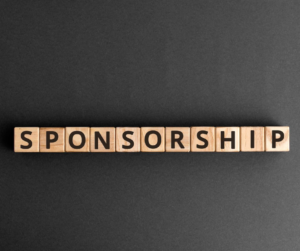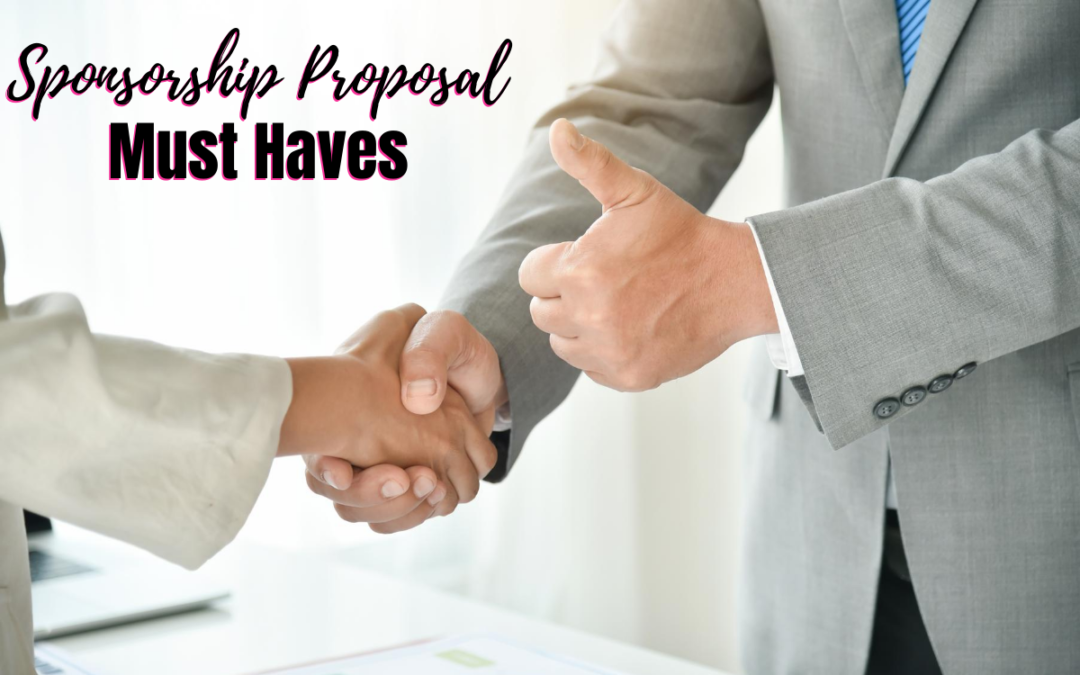Sponsors have a job to do. Selecting where they spend their marketing dollars is not the same as figuring out how to blow your wardrobe budget. The weight of ROI (Return on Investment), and like-minded impressions with results, sit on every investor’s shoulders. Knowing exactly where their budget is going, is mandatory.
 But, you have a responsibility to your event, too. Roping in sponsors for your event is equally as important (with no sponsors, who will you put on the back of your shirts? Heck, who will pay for the t-shirts?) We are here to help you nail that next sponsorship pitch by showing your best self, and keeping the focus on your sponsor’s needs, not yours.
But, you have a responsibility to your event, too. Roping in sponsors for your event is equally as important (with no sponsors, who will you put on the back of your shirts? Heck, who will pay for the t-shirts?) We are here to help you nail that next sponsorship pitch by showing your best self, and keeping the focus on your sponsor’s needs, not yours.
What’s your story?
The best way to start a proposal pitch – make the focus on your potential partner and their personal needs. We tend to give money to people we like and trust; much quicker than a car salesman for example. Be the family friend, not the car salesman pushing to make a sale. Then, once you’ve noticed they’re chatty, that’s the time to insert yourself. Not one moment sooner, or you’ll lose them. Being interesting and displaying your accomplishments and success, tastefully, is highly recommended at this point. Honestly, if you wouldn’t want to join forces with you, who would? Having an interesting and outgoing personality will further you in cultivating relationships with potential sponsors. Plus, keeping your style a little weird, will make you memorable.
Providing profitable facts about your event will encourage a sponsor to partner with you. Take, for example, James Jensen, Director of Sponsorships at the Las Vegas Ballpark for the Aviators (AAA baseball team for Oakland Athletics). When pitching a sponsorship proposal, James brings to light the important metrics – ticket sales, attendees, impressions, and viewership per game. Providing sponsors with an analysis of the success of prior events, with a positive forecast of the future year, will encourage sponsors to drop the moolah!
Who was there?
Demographics may be the singular most important detail to know when pitching partnership opportunities. Your partner has a responsibility to their product to produce numbers. Sponsors want to know exactly what audience attends your event to ensure their target demographic is being reached. Audience personas are important to help focus a sponsor’s promotional efforts to create content that is interesting and relevant to their fans and the target audience of their sponsors.
What do they get?
Usually, sponsorships are broken down into packages. For example, when pitching the Pink Package, be sure to mention everything that comes along with said package, and include the next tier up package. With the purchase of the Pink Package, you will have your company logo on a warm-up jersey but, for only a few extra dollars, the Diamond Package includes your company logo on a warm-up jersey, and painted up on the side of the field walls.
Every package and what they encompass must be clearly laid out; leave nothing uncertain, or messy. If you cannot clearly deliver what you’re offering and the value presented, you can’t expect your buyer to follow you.
Another pro tip, make their logo eye candy. Give your partner the visual of exactly how their branding will fit into your event. Mockup your offerings with the company’s logo already part of the stadium. Giving a visual of what to expect per package, will only increase your odds of winning over a sponsor and gaining a partnership.

How much?
Always include the price in your pitch. Who doesn’t want to know exactly what they are paying for upfront? Ever fall in love with a dress and then find out what the price was after, and then you’re heartbroken? Don’t be that dress! If the ticket price is going up during the championship game, let them know. The potential sponsors are savvy negotiators, they need to know how much wiggle room there is in the budget.
On the receiving end, be willing to build a relationship and adjust packages that you will both benefit from.
What’s the forecast?
No two events or seasons are the same. Are there going to be bonus events? Throw some numbers in there. Will any of the games be televised this season? Tell them which network, and what the ratings and viewership impressions that network providers are. How many people are projected to be at each game? If a large event like the championship game is scheduled to be held at your stadium, put that on the docket. These defining details will be the cherry on top for your agreement and your events pocketbook.
Be candid, transparent, and honest in all your business doings. Building trust is the most important step in a relationship. Being honest and putting all the cards on the table will not only secure your relationship but secure your deal, too.
Still want to do some research? Study our interviews with Jeff Meyer and James Jensen, both of who are experts in this space, and bring their own style!



Recent Comments